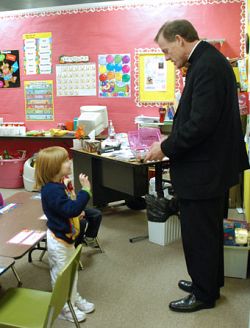Bishop Wester reflects on Referendum 1: Private School Vouchers

SALT LAKE CITY — "It is unfortunate that people have gone to such extremes on both sides of Referendum 1 ("The Parent Choice in Education Act"), Bishop John C. Wester of the Diocese of Salt Lake City said in an Oct. 18 interview with the Intermountain Catholic. "After a rational review of the issues, in my view, it is a win-win referendum." Both public and private schools would benefit from the vouchers, put before the voters as Referendum 1, or House Bill 148, he said. "Most important, parents and children would benefit. They are, after all, what our schools are all about." "I attended public schools for the first four years of my education. Those years were very important in my formation, as were the years of Catholic education I received. I would never support an action that would hurt public schools." It isn’t just his support for the Diocese of Salt Lake City’s Catholic schools, which could benefit from vouchers, that prompts Bishop Wester’s concern. Only about 10 percent of Catholic young people live close enough to a Catholic school to attend. That leaves 90 percent of Catholic students in public schools. Bishop Wester said all Utah students deserve the best education the state can offer. Referendum 1 would give parents the choice of sending their children to public schools or receive scholarship funds to send them to a private school, secular or sectarian. It also assures families accepting voucher funds, which would come out of the state’s general funds, would be assured their children would be educated in an atmosphere of diversity. "Diversity in the school system assures that we have a healthy system," the bishop said. In an opinion column printed Oct. 20 in the Salt Lake Tribune, Dr. Gabriel Colosimo, principal of Juan Diego Catholic High School, revealed that in the context of choice programs, private schools in general and especially those participating in voucher programs are much less segregated than public schools because public school demographics are based on where students of a similar group live. "Utah’s new voucher law may actually decrease segregation, but certainly will not increase it," Colosimo wrote. State or federal money going to a sectarian school is not a new idea, Bishop Wester said. For years students attending Catholic colleges and universities have benefitted from Pell grants, for example. "The school voucher issue is not a tangling of church and state issues. The provision prohibits the state from establishing a religion or persecuting or favoring a particular religion. This is not what school vouchers are all about. The state can certainly create an atmosphere in which its citizens can live with freedom and enjoy many options in meeting the needs of their children," he said. Colosimo’s column addressed the issue of vouchers taking money from public schools to educate "the anticipated swell of new students" in the coming years. "National research on established choice programs has shown all of them to be at least ‘fiscally neutral,’" Colosimo wrote, "and the majority (10 of 12 studied) to be a cost savings. These choice programs relieve public schools of the obligation to educate a student while at the same time keeping the majority of the money for that student in the public school. Where choice programs have been implemented, there has been no tendency to slow the growth of funds to public schools. Utah’s carefully crafted voucher law means more money and fewer students for public schools while providing more families the chance for a private education. "While the amount of money private and public school schools get differs, it doesn’t seem, at the end of the day, that public education will be strapped for funds because of vouchers. Money will be there for public and private schools in equitable ways and there are safeguards in the bill to assure funding for public schools. Vouchers will not cover the total tuition cost for private schools, but they will be a help. "These same private school parents whose taxes go to pay for public education, with or without vouchers, will still be paying taxes into the general fund." Bishop Wester said he agrees with Utah’s Governor Jon Huntsman Jr., who, in a press conference Oct. 17, said the state will see a tremendous increase in students over the next 10 years and we need to be creative in how we provide educations for these students. "Public and private schools together must find ways to address the challenges of the days ahead," the bishop said. "There must be diversity, accountability, and qualified faculties to meet the needs of all Utah students." Speaking for Catholic schools in particular, Bishop Wester said the Northwest Association of Accredited Schools (NAAS) accredits all of our Catholic schools, which hire only licensed educators or teachers enrolled in licensure programs. "Every Utah voter should educate himself or herself and take interest in this process," the bishop said. "Every voter must make an informed decision on Referendum 1 before Nov. 6 "I hope we can establish a healthy, prosperous educational atmosphere in Utah; one in which children can benefit from excellent public and private schools, all of which are well funded and excel in the formation of children."
© Copyright 2024 The Diocese of Salt Lake City. All rights reserved.

Stay Connected With Us